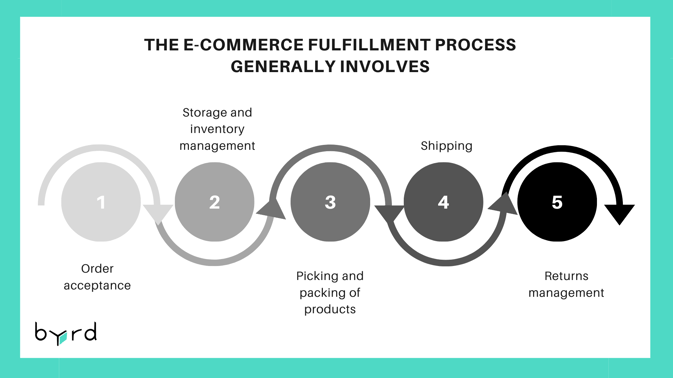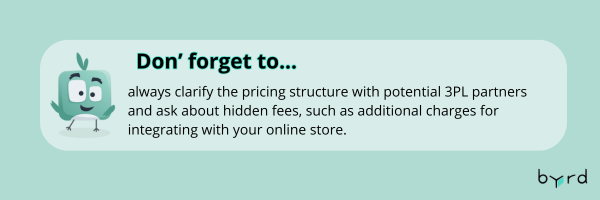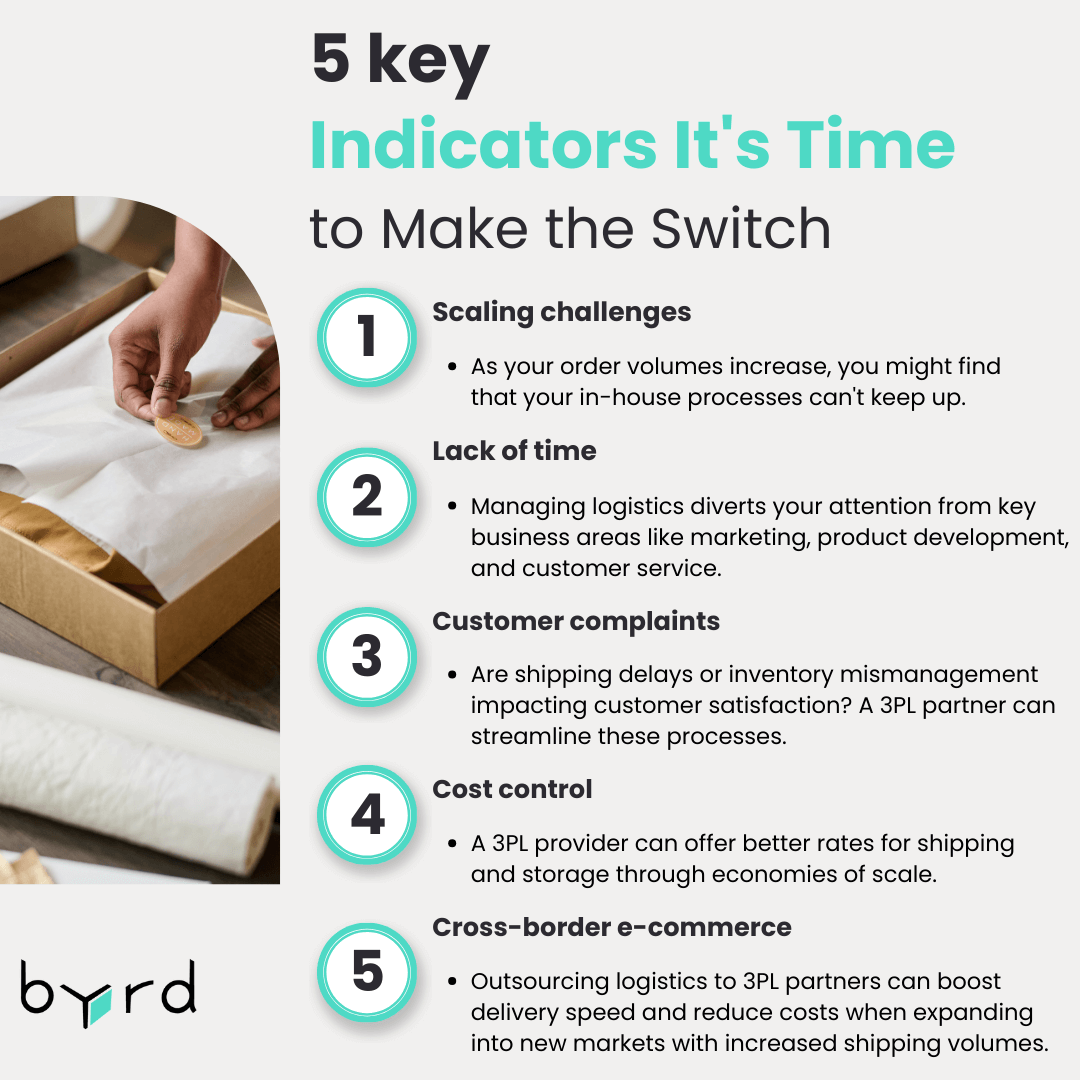3PL and E-Commerce Fulfillment: A Game-Changer for Growing Businesses
Table of Content
As an e-commerce decision-maker, you may be facing challenges in logistics that are costing you time, money, and, most importantly, customer satisfaction. The right fulfillment strategy, whether in-house or with a trusted 3PL (Third-Party Logistics) partner, can transform logistics from a cost center into a growth driver. Successful e-commerce businesses often share a key trait: exceptional fulfillment operations.
In this article, we’ll dive into the essentials of e-commerce fulfillment and 3PL services, and address key questions you may have.
What is E-commerce Fulfillment?
E-commerce fulfillment refers to the entire process of fulfilling customer orders, from the moment a purchase is made to when the product arrives at the customer’s doorstep and beyond.

In short, it encompasses all the logistical tasks involved in getting a product from your warehouse to your customer's hands.
The Costs of E-Commerce Fulfillment
Fulfillment involves costs, whether you manage it in-house or partner with a 3PL provider. Here's a breakdown of the expenses associated with each option.
Costs of In-House Fulfillment
If you’re managing fulfillment on your own, here are some of the costs you’ll need to consider:
- Warehouse Costs: Renting warehouse space is one of the biggest expenses. A good location is critical to minimize shipping times and costs, but you’ll also need to account for utilities like electricity and water.
- Software and Hardware: While you could track inventory with simple tools like spreadsheets, investing in warehouse management software (WMS) and hardware like tablets and barcode scanners will drastically improve efficiency as you grow.
- Insurance: Protecting your inventory with insurance is essential, especially as your business grows. Accidents or damages in the warehouse can lead to significant financial loss if you're not covered.
- Shipping Costs: As your order volumes increase, you’ll need to negotiate contracts with shipping service providers. Volume-based discounts can significantly reduce shipping costs, but managing these relationships requires time and attention.
- Packaging Material: While you can save by buying in bulk, storage becomes a challenge. Also, consider branding your packaging for a better unboxing experience, which can boost customer loyalty and satisfaction.
- Labor: As your business grows, so does the need for a flexible workforce, especially during peak seasons. You’ll need to scale your team up and down depending on demand, which adds another layer of complexity.
Costs of Outsourcing Fulfillment to a 3PL Provider
Working with a 3PL provider can reduce your overhead costs and free up your time, but it’s important to understand the pricing structures involved. Most 3PL providers use activity-based pricing, meaning you pay for the services you use. The typical cost categories include:
- Setup Fees: An initial fee for integrating your systems with the 3PL provider.
- Storage Fees: Charged based on the number of SKUs or cubic meters of inventory stored.
- Pick and Pack Fees: Based on the number of orders processed.
- Packaging Costs: This may include standard packaging or branded options.
- Shipping Fees: Determined by the volume of orders, destination, and shipping method.
- Returns Handling: Costs for managing returns and restocking items.
- Value-added Services: This can include various services that’ll help your brand perform better

When Should You Outsource E-Commerce Fulfillment to a 3PL?
In the early stages of your business, you might have managed everything yourself - packing orders in your garage or living room. But as your business grows, handling fulfillment on your own becomes less sustainable. So, when is the right time to outsource to a 3PL provider?

What Is 3PL and How Does It Work?
Third-party logistics (3PL) providers allow you to outsource various aspects of your fulfillment operations, such as warehousing, inventory management, and shipping. Here’s how it works:
- Stock Management: Your products are stored in the 3PL’s warehouse, where they are tracked and managed efficiently.
- Order Processing: When an order comes in, the 3PL handles picking, packing, and shipping to the customer.
- Returns Management: 3PLs also manage returns, ensuring that restocked items are properly logged into inventory.
Why use a 3PL? By outsourcing these logistics functions, you can focus on what you do best - growing your business - while the 3PL ensures that orders are delivered quickly and accurately.
Benefits of Outsourcing to a 3PL Provider
Partnering with a 3PL offers a variety of advantages that can transform how your business operates:
- Save Time: Free up valuable time that can be redirected towards growing your business, rather than managing day-to-day logistics.
- Expertise and Technology: 3PL providers bring specialized knowledge and state-of-the-art technology to streamline fulfillment operations.
- Scalability: 3PLs allow you to scale your operations quickly, without worrying about running out of warehouse space or hiring seasonal workers.
- Faster Shipping: With strategically located warehouses, 3PL providers can offer quicker delivery times, which is crucial as customers increasingly expect same-day or next-day shipping.
- Cost Savings: By leveraging the purchasing power of a 3PL, you benefit from lower shipping rates and better inventory management systems.
Key Considerations When Choosing a 3PL Partner
Before choosing a 3PL partner, consider the following factors:
- Pricing Models: Ensure that the pricing structure fits your business model. Ask whether the storage fees are based on SKUs or cubic meters, and clarify all additional charges upfront.
- Integration Capabilities: Make sure the 3PL provider integrates seamlessly with your e-commerce platform for a fully automated fulfillment process.
- Geographical Reach: Choose a partner with warehouse locations that support your target markets for faster delivery times.
- Shipping Partners: Ensure the 3PL works with a variety of shipping carriers to give you flexible, cost-effective options.
Conclusion: Is 3PL Fulfillment Right for You?
Outsourcing fulfillment to a 3PL can be a game-changer for your business. By freeing up your time, reducing operational costs, and providing the infrastructure needed to scale, a 3PL partnership allows you to focus on growing your business rather than managing logistics.
If you’re ready to streamline your fulfillment and improve customer satisfaction, consider partnering with a trusted 3PL provider like byrd. Reach out today to see how we can help your business scale efficiently and cost-effectively.